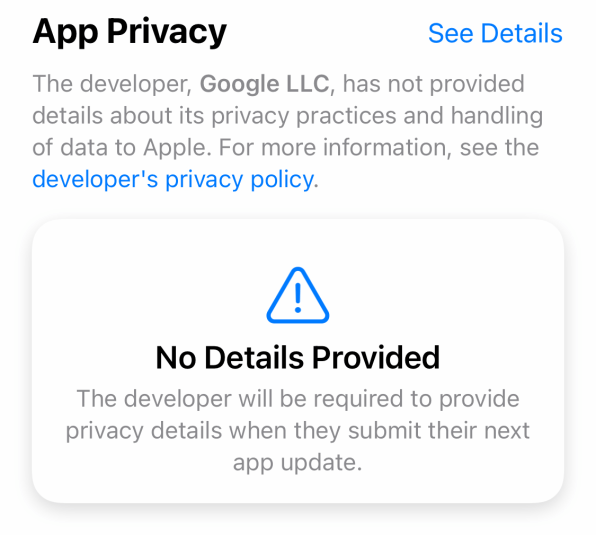Not a single one of Google’s iOS apps have been updated in almost a month—an unusually long period for a tech behemoth not to release, at the very least, even a minor bug fix or stability update for one of its dozens of insanely popular iPhone and iPad apps. And after reviewing the latest release dates for all of Google’s iOS apps, one reason for this lack of updates seems more likely than others: It could be related to Apple’s new App Store privacy labels.
The last time any Google iOS app was updated was on December 7. This includes updates to major Google apps like Google Drive, YouTube, Google Docs, Google Sheets, YouTube Music, Google Duo, Google Authenticator, and Gboard.
Why is December 7 a significant date? Because starting on December 8, Apple mandated that any new apps or app updates submitted to the App Store would require the developer to fill out the privacy label information for the app it was submitting. This privacy label reveals exactly what data the app is collecting about the user and how that user data is being used. The label can then be viewed on an app’s App Store listing page. The feature is part of Apple’s push to make developers be more transparent in the ways they collect and use user data, so users can make more informed choices about the apps they choose to download.
Google did not respond to a request for comment about its lack of updates.
When I spoke with Apple’s senior vice president of software engineering, Craig Federighi, ahead of the privacy label launch in early December, Federighi told me the labels are something he hopes other app stores copy. But far from copying the privacy label idea for the hundreds of thousands of apps on its own Google Play app store, it appears Google doesn’t even like the idea of privacy labels being applied to its iOS apps in Apple’s App Store.
By getting in all its existing apps’ updates on or before December 7, Google has managed to avoid filling out a privacy label for any of their apps so far. You can verify this yourself by launching the App Store app on your iPhone, selecting any Google-owned app in the store, and then checking its privacy label on the app’s listing. As of the time of this writing, you’ll see every Google app’s privacy label still reads, “No Details Provided. The developer will be required to provide privacy details when they submit their next app update.”

Other major apps that Google last updated just under the December 8 wire include Google Home on December 5; Google Pay on December 3; Google Photos, Google Assistant, and Google News on December 2; Google Maps and Gmail on December 1; and Google Chrome on November 30.
Google’s Android apps, on the other hand, have been updated well past December 8, including the Android Gmail app on December 16, the YouTube app on December 21, Google Duo on December 15, and Google Maps on December 14,
As for why Google might be trying to delay revealing its privacy label information, it’s possible the company saw all the bad press Facebook got when the social media giant was forced to reveal all the ways its apps track users, and the press and social media reactions spooked the company. Facebook Messenger’s privacy labels are horrifyingly long, for example.
For anyone following along, iOS 14 now requires apps to have a “nutrition label” of sorts in regard to what data they collect on you. (This is a good thing) This is facebooks. #privacy #apple #facebook pic.twitter.com/IxKo7sPQjm
— Stu (@Kuja_Stu) December 16, 2020
But if Google is trying to delay the unveiling of its privacy labels for fear of similar bad press, it makes one wonder just how bad its privacy labels are going to be. I mean, it’s hard to believe they could be any worse than Facebook’s. Then again, Google’s user privacy policies, or lack thereof, have historically left much to be desired.
Either way, we will eventually find out—the question is when. After all, Google cannot continue not updating any of its iOS apps, which are some of the most popular apps on the iPhone. So when will those updates come?
This post will be updated if we hear back from Google.




